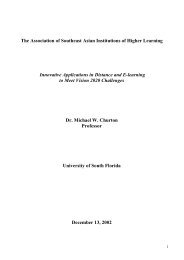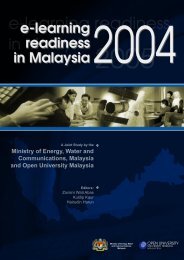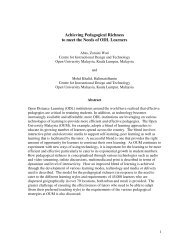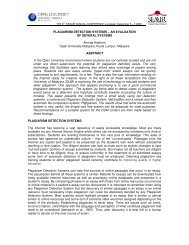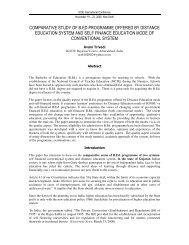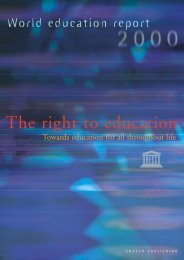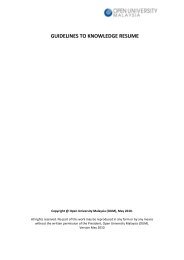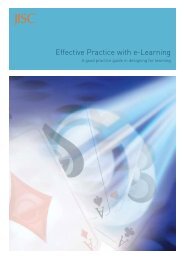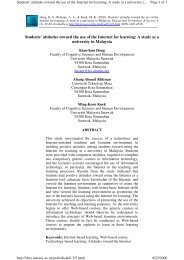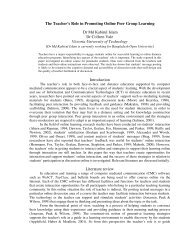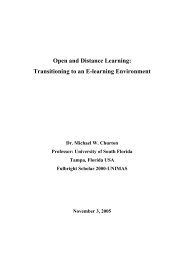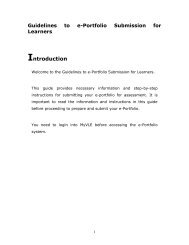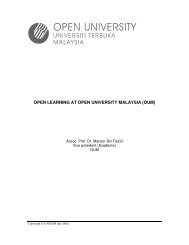a particular colouring, <strong>and</strong> offer a particular “model”; but these models are all mutuallycomplementary, <strong>and</strong> will vary from one situation to another.The scientific <strong>and</strong> technological background plays a supremely important role. Thetwenty-first century has been called the “Century of Grey Matter”, meaning the intellect,which constitutes a new source of wealth for our planet. Science is making spectacularprogress, from the infinitely great to the infinitely small. Astronomers send their probes tothe edges of our galaxy, while nanotechnology unravels the mysteries of a world invisibleto the naked eye. Biology is now mastering cloning <strong>and</strong> other secrets of human life.Though there are still scourges such as AIDS to be conquered, medicine has succeeded inincreasing life expectancy.These heady developments are instantly recognised, communicated, explained <strong>and</strong>exploited all over the world in real time, thanks to another development no lessspectacular, that of information <strong>and</strong> communication technology (ICT). This is provinga valuable tool for diffusing knowledge, though much remains to be done if we are toremedy the digital divide between those who can <strong>and</strong> those who cannot master suchtechnology.Acquiring knowledge, making it available to as many as possible, keeping up to date withprogress in each field of competence, is becoming essential both for individuals <strong>and</strong> forstates that are making research — the creation of new knowledge — one of their politicalpriorities. As the process unfolds over the long term, it clearly falls to <strong>lifelong</strong> <strong>learning</strong>to give everyone the opportunity of thinking about the gaps in their underst<strong>and</strong>ing(“<strong>learning</strong> to learn”, as Jacques Delors says), <strong>and</strong> filling them in so as to keep up withprogress. Already two missions, two “models”, begin to emerge: a “reflective <strong>learning</strong>”model <strong>and</strong> a “compensatory” model, to use the classification introduced by ChristopherMcIntosh in Chapter 1 of this book.The economic background cannot be separated from the scientific <strong>and</strong> technological one.Knowledge obviously feeds innovation; it is harnessed in the service of development,<strong>and</strong> in particular of wealth-generating economic development. Here globalisation, whichis such a feature of our twenty-first century, is without any doubt a source of manyblessings, such as international solidarity <strong>and</strong> the sharing of resources, as we have seenwith the recent terrible events in South-East <strong>Asia</strong>; but it also gives rise to ferociousinternational competition. Terms like “centres of excellence”, or “competitiveness”, or“attraction” are already part of everyday speech. This is a race in which states know fullwell they need to equip themselves with the best skilled <strong>and</strong> qualified human resourcespossible.For individuals, such incessant economic changes — there is already talk of the“liquid society” (Bauman 2000), meaning a society in constant flux — can be painful,involving company closures, dislocation <strong>and</strong> relocation, forced restructurings, <strong>and</strong>so on. It is now acknowledged that in the next ten years, even those who are luckyenough not to suffer unemployment will still have to face re-skilling <strong>and</strong> reorientationin order to find work. Diplomas <strong>and</strong> degrees gained between the ages of 18 <strong>and</strong> 25 willno longer be an employment passport for life. Employability is becoming a concernfor everyone. The economy has its changing requirements, <strong>and</strong> those responsible for<strong>education</strong> are called on not to lose sight of the need to ensure that training stays in linewith employment prospects. Lifelong <strong>learning</strong> must provide its learners with the toolsnecessary for “staying in the race”: the quality of human capital depends on it, <strong>and</strong> herethe “functionalist” model takes precedence over all others.13
Lastly, our analysis of the situation must also take social <strong>and</strong> cultural factors into account.Leaving no-one by the side of the road if it can be helped; reducing inequalities; givingeverybody a chance to learn <strong>and</strong> win a place in the sun: these things also work in favourof equity <strong>and</strong> social cohesion. This is the “model” which the Council of Europe haschosen to make its priority: opening the doors of <strong>higher</strong> <strong>education</strong> to people who have sofar been under-represented there — women, ethnic <strong>and</strong> cultural minorities, the disabled,young <strong>and</strong> not-so-young people from underprivileged social backgrounds. It is the idealof social justice <strong>and</strong> equal opportunity, without which it is not possible to live together inharmony.Such <strong>learning</strong> has one last function, however; last, but by no means least. That is the“humanistic” model — still referring to the classification presented in the introductorychapter — which leads to a better quality of life, with no functional concerns of anykind. As life expectancy increases, there are more <strong>and</strong> more adults, whether still workingor retired, going (or going back) to university to get further cultural <strong>education</strong> just forpleasure. Hence the growing popularity of the so-called “leisure universities”, or callthem what you will, offering courses <strong>and</strong> lectures on an immense variety of subjectsto a new clientele eager for self-cultivation, wider horizons <strong>and</strong> knowledge, for thesatisfaction they can bring.A NEW CLIENTELE AND ITS REQUIREMENTSTo characterise the new clientele now knocking at the doors of universities in the name of<strong>lifelong</strong> <strong>learning</strong>, we shall be using the classification proposed by Ulrich Teichler 3 . Thisclientele can be divided into three categories: postponers, who could have had accessto <strong>higher</strong> <strong>education</strong> at the end of their secondary <strong>education</strong>, but put it off for variouspersonal or career reasons; returners, who have already benefited from it, <strong>and</strong> comeback for a second slice of the cake, so to speak — either to upgrade their knowledgefor the purposes of a better job or simply to enjoy cultural improvement for their ownwell-being; <strong>and</strong> lastly, second chancers, those who have not yet had an opportunityto benefit from academic <strong>learning</strong>, <strong>and</strong> who apply for or are offered another chanceto do so. Most of these are from underprivileged groups that have so far been underrepresentedin <strong>higher</strong> <strong>education</strong>: members of ethnic <strong>and</strong> cultural minorities, less well-offsocial backgrounds, women with family commitments, disabled people, <strong>and</strong> the largenumbers who left compulsory schooling without qualifications. This last category, thesecond chancers, is the one we are primarily dealing with here, since the others can easilyfind their way into universities when they want. But the third clientele is comparativelyvulnerable, which makes it harder for them to participate in <strong>education</strong>, <strong>and</strong> makes theirintegration a challenge to be taken up every day.First of all, these people suffer from economic weakness in one form or another. Theymay be unemployed or in jobs that bring in too little to support their needs <strong>and</strong> those oftheir family, <strong>and</strong> are looking for skills <strong>and</strong> qualifications that would enable them to get amore secure footing in the job market. Their expectations are high <strong>and</strong> specific; they need“<strong>learning</strong> to do” above all, but they also need “<strong>learning</strong> to learn”, because their situationis sure to remain precarious <strong>and</strong> this will require a good deal of reorientation.How are these less well-off clients to finance their studies? How can they pay the feesgiving access to <strong>higher</strong> <strong>education</strong>? In their case society will have to step in to coverall or some of the costs of their studies. In some instances, the law provides for this: inFrance, employers must pay a proportion of their income (the “employer’s one per cent”)towards the ongoing training of their staff. This training may be provided within the firm,which can create its own campus by clearly defining its needs in order to increase the14
- Page 1 and 2: PERSPECTIVES ONDISTANCE EDUCATIONLi
- Page 3 and 4: The Commonwealth of Learning (COL)
- Page 5 and 6: ACKNOWLEDGEMENTSIn addition to the
- Page 7 and 8: These are some of the issues that a
- Page 9 and 10: What are the trends and issues in l
- Page 11 and 12: of policy implications relating to
- Page 13 and 14: evince important differences that c
- Page 15 and 16: inequitable regulations governing t
- Page 17 and 18: associations and groups of countrie
- Page 19 and 20: THE CONTRIBUTORChristopher McIntosh
- Page 21: INTRODUCTIONIn his 1996 report to U
- Page 25 and 26: diploma or similar certificates of
- Page 27 and 28: force of the undertaking. Here agai
- Page 29 and 30: RELEVANT INTERNET SITESUNESCO Task
- Page 31 and 32: Notes1. This phrasing has been used
- Page 33 and 34: goals (Daniel, 1996). Lifelong lear
- Page 35 and 36: eported that group activity had red
- Page 37 and 38: NEW AREAS FOR DISTANCE EDUCATION:WO
- Page 39 and 40: targets systematically for the use
- Page 41 and 42: Rausch, A.S. (2003). A case study o
- Page 43 and 44: correspondence teaching systems tha
- Page 45 and 46: significant differences between syn
- Page 47 and 48: In distance flexible- and blended-e
- Page 49 and 50: STATE-FUNDED DUAL-MODE SYSTEMS ATUN
- Page 51 and 52: Table 4.2: Fundable elements in dis
- Page 53 and 54: sciences in 21 countries of the reg
- Page 55 and 56: How a system is funded depends in p
- Page 57 and 58: Litto, Fredric M. (2004). Digital l
- Page 59 and 60: CHAPTER 5LIFELONG LEARNING IN THE A
- Page 61 and 62: education, which was initiated by C
- Page 63 and 64: So the virtual classroom acted as a
- Page 65 and 66: In June 2002, when the course came
- Page 67 and 68: RELEVANT INTERNET SITESFORCIIR proj
- Page 69 and 70: 11. The approximate rate for 1€ w
- Page 71 and 72: The term modern distance education
- Page 73 and 74:
the National Networked Consortium f
- Page 75 and 76:
important resource for undeveloped
- Page 77 and 78:
standards have been proposed for th
- Page 79 and 80:
The development of e-learning withi
- Page 81 and 82:
RELEVANT INTERNET SITESCCRTVU Onlin
- Page 83 and 84:
MoE (2004b) The Notice on Running N
- Page 85 and 86:
CHAPTER 7QUALITY ASSURANCE SURVEYOF
- Page 87 and 88:
(Paris, France, 28-29 June 2004) in
- Page 89 and 90:
Examples of elaborated QA policies:
- Page 91 and 92:
plans and produces its conventional
- Page 93 and 94:
SHTVU (China)• Teaching• Teachi
- Page 95 and 96:
offers its programmes to Turkish ci
- Page 97 and 98:
mega universities apply a set of st
- Page 99 and 100:
RELEVANT INTERNET SITESThe Commonwe
- Page 101 and 102:
2. QA initiatives or publications b
- Page 103 and 104:
assurance of ODL. This DST will be
- Page 105 and 106:
Educational Planning has been respo
- Page 107 and 108:
A system of weighting of the key qu
- Page 109 and 110:
RELEVANT INTERNET SITESHigher Educa
- Page 111 and 112:
CHAPTER 9THE FINNISH VIRTUAL UNIVER
- Page 113 and 114:
foreign providers. In Finland, the
- Page 115 and 116:
to make the best use of new educati
- Page 117 and 118:
The foremost task for the Service U
- Page 119 and 120:
part of quality management. The aim
- Page 121 and 122:
online courses; an educational tech
- Page 123 and 124:
polytechnics, research institutions
- Page 125 and 126:
CHAPTER 10PROMOTING CROSS-BORDERREC
- Page 127 and 128:
The Bologna Declaration was followe
- Page 129 and 130:
indicators currently being used for
- Page 131 and 132:
the qualification resulting from th
- Page 133 and 134:
Table 9.1: Outline of the portfolio
- Page 135 and 136:
• Make sure that incoming student
- Page 137 and 138:
CHAPTER 11CHARTING THE EVOLUTIONOF
- Page 139 and 140:
Another common characteristic was t
- Page 141 and 142:
the current capacity of the educati
- Page 143 and 144:
conditions for success. Conditions
- Page 145 and 146:
Cultural and ethical issues in inte
- Page 147 and 148:
the cost and maintenance of learnin
- Page 149 and 150:
Research can be a useful tool for c
- Page 151 and 152:
REFERENCESBates, A. (1995). Technol
- Page 153 and 154:
Twigg, C. (2001). Quality Assurance
- Page 155 and 156:
y, for example, entering into partn
- Page 157 and 158:
and even greater steps, and the dec



